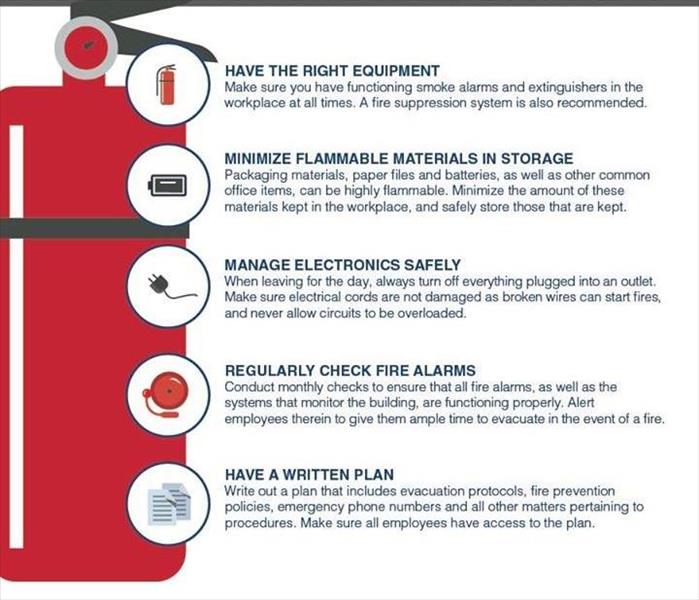Would your business be prepared in the case of a fire?
2/8/2020 (Permalink)
 Whether you’re a small business owner or are in charge of a large corporation, commercial fire protection is not a step you can afford to skip.
Whether you’re a small business owner or are in charge of a large corporation, commercial fire protection is not a step you can afford to skip.
If you’re a small business owner, your very livelihood depends on your company’s ability to function. A workplace fire can have disastrous consequences on your business — which is just one of the many, many reasons it’s important to prevent a fire before it ever starts. Not every fire can be prevented, but by following this safety checklist, you’ll be able to eliminate the majority of fire risks from the get-go. Here are some fire safety rules you should be sure to follow for your small business:
- Occupancy rating
Buildings have specific occupancy ratings that specify how it can be used and how many people can be inside at one time. In order to reduce the chances of a fire and to be able to follow proper safety procedures in the event of one, you must comply with these rules. The occupancy rating will also outline the types of fire-resistant construction and fire protection systems that are required for that location. These are not merely suggestions; these are rules that you must implement and maintain in order to ensure safety and lawful compliance.
- Fire protection systems
Your business and area will determine the requirements for fire extinguishers and protection systems. Typically, every 3,000 square feet of area requires one fire extinguisher. Extinguishers also have specific ratings that need to be met. In addition, your business will need a commercial fire sprinkler system and fire alarm systems. Many restaurant owners or hoteliers may also want a fire suppression and detection system, as non-chemical suppression systems operate effectively 96% of the time in commercial areas with large oven ranges. This can have a huge impact on the amount of damage a kitchen fire can do.
- Regular inspections
Fire inspectors will typically conduct examinations for commercial buildings every two years in order to identify fire safety code violations and to educate owners on fire safety. Routine inspections have been proven to reduce fires and the losses they create. In addition, you should have your fire protection systems examined on a routine basis, especially in the event they have been recently used. Fire extinguishers need to be replaced after use and should be examined monthly.
- Evacuation plan
The amount of businesses that have a solid plan for evacuation in the event of an emergency is inexcusably low. Out of 119 businesses surveyed, only 35% had any sort of fire evacuation plan. At a minimum, your plan needs to include a preferred method for reporting emergencies, evacuation policy and procedure, a floor plan and emergency escape route, and safety procedures during an emergency. Having a clear plan that’s accessible to all employers and employees is vital during an emergency.






 24/7 Emergency Service
24/7 Emergency Service